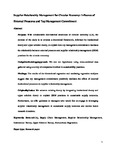Supplier Relationship Management for Circular Economy: Influence of External Pressures and Top Management Commitment
| dc.contributor.author | Dubey, R | |
| dc.contributor.author | Gunasekaran, A | |
| dc.contributor.author | Childe, Stephen J | |
| dc.contributor.author | Papadopoulos, T | |
| dc.contributor.author | Helo, P | |
| dc.date.accessioned | 2018-06-13T20:25:13Z | |
| dc.date.issued | 2019 | |
| dc.identifier.issn | 0025-1747 | |
| dc.identifier.issn | 1758-6070 | |
| dc.identifier.uri | http://hdl.handle.net/10026.1/11658 | |
| dc.description.abstract |
With considerable international awareness of circular economy (CE), the purpose of the study is to propose a theoretical framework, informed by institutional theory and upper echelon theory, to explain how top management commitment mediates the relationship between external pressures and supplier relationship management (SRM) practices for circular economy. We test our hypotheses using cross-sectional data gathered using a survey of companies involved in sustainability practices. The results of the hierarchical regression and mediating regression analyses suggest that top management commitment positively mediates the effect of external institutional pressures on supplier relationship management. We advance existing theory by integrating institutional theory and upper echelon theory to explain SRM practices in sustainable supply networks. Furthermore, we offer guidance to managers who would like to engage in leveraging supplier relationship management in sustainable supply networks and outline future research directions. | |
| dc.format.extent | 767-790 | |
| dc.language | en | |
| dc.language.iso | en | |
| dc.publisher | Emerald | |
| dc.subject | Sustainability | |
| dc.subject | Supply Chain Management | |
| dc.subject | Supplier Relationship Management | |
| dc.subject | Institutional Theory | |
| dc.subject | Upper Echelon Theory | |
| dc.subject | Hierarchical Regression | |
| dc.title | Supplier Relationship Management for Circular Economy: Influence of External Pressures and Top Management Commitment | |
| dc.type | journal-article | |
| dc.type | Journal Article | |
| plymouth.author-url | https://www.webofscience.com/api/gateway?GWVersion=2&SrcApp=PARTNER_APP&SrcAuth=LinksAMR&KeyUT=WOS:000463801600001&DestLinkType=FullRecord&DestApp=ALL_WOS&UsrCustomerID=11bb513d99f797142bcfeffcc58ea008 | |
| plymouth.issue | 4 | |
| plymouth.volume | 57 | |
| plymouth.publication-status | Published | |
| plymouth.journal | Management Decision | |
| dc.identifier.doi | 10.1108/MD-04-2018-0396 | |
| plymouth.organisational-group | /Plymouth | |
| plymouth.organisational-group | /Plymouth/Faculty of Arts, Humanities and Business | |
| plymouth.organisational-group | /Plymouth/Faculty of Arts, Humanities and Business/Plymouth Business School | |
| plymouth.organisational-group | /Plymouth/REF 2021 Researchers by UoA | |
| plymouth.organisational-group | /Plymouth/REF 2021 Researchers by UoA/UoA17 Business and Management Studies | |
| plymouth.organisational-group | /Plymouth/Users by role | |
| plymouth.organisational-group | /Plymouth/Users by role/Academics | |
| dcterms.dateAccepted | 2018-06-13 | |
| dc.rights.embargodate | 2019-4-10 | |
| dc.identifier.eissn | 1758-6070 | |
| dc.rights.embargoperiod | Not known | |
| rioxxterms.versionofrecord | 10.1108/MD-04-2018-0396 | |
| rioxxterms.licenseref.uri | http://www.rioxx.net/licenses/all-rights-reserved | |
| rioxxterms.licenseref.startdate | 2019 | |
| rioxxterms.type | Journal Article/Review |


